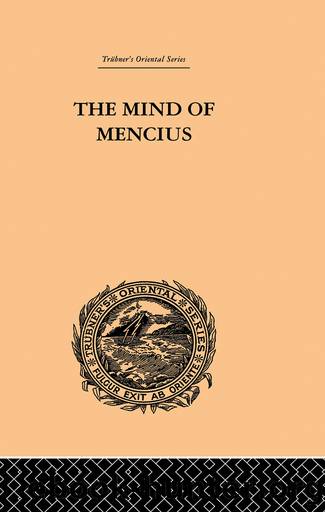The Mind of Mencius by E. Faber

Author:E. Faber [Faber, E.]
Language: eng
Format: epub
Tags: Social Science, Ethnic Studies, General
ISBN: 9780415244886
Google: HQiSzm6D8_cC
Publisher: Psychology Press
Published: 2000-01-15T04:54:08+00:00
PART II.
THE ETHICO-SOCIAL RELATIONS.
CHAPTER I.
FATHEE AND SON.
(a.) The Father.
276. INFLUENCE of affection (p. 218). âWhen father and mother love their son, he rejoices and does not forget them.â The nature of the love of parents is unfortunately not defined, though that is important in order to dis tinguish the purely natural (instinctive) love from its ethical conformation and transformation. This passage is closely connected with that in which only the duty of sons is inculcated to win the love of their parents, and not the duty of parents to love their children.
277. âExhortations on arriving at maturityâ (p. 140). These are referred to, but not described.
278. âThe father does not instruct the son himselfâ (p. 184). âA disciple asked, âWhy does not the superior man teach his own son?â â Mencius answered, âIt com ports not with his authority. Instruction must be accom panied by correction. If there be not correction (of habits, &c.), there will follow passion (severity) ; if severity ensues there will be perverse ill-temper. (The son says), âMy honoured sire instructs me in what is correct, yet does not tend towards what is rightâ (does not himself act rightly) So there is discord between father and son ; when that is the case it is bad. The ancients exchanged sons and so instructed them. Between father and son there should be no censure compelling one to be good. If there be, alienation will result: nothing is so injurious as alienation.ââ Rightly to unite severity with affection is one of the most difficult problems in education. How many failures are made on both sides is proved by the number of spoilt young people. In the present day there are far more owing to the prevalent overlooking of small faults. We must also make a difference between instruc tion and education. The parent is seldom practically in a position to instruct his child, but education should be chiefly the work of the parents ; these also should by proper preparation put themselves in a position to effect this. In the above passages we have nearly all that jVIencius has to say about the position of parents towards their children. The duties of parents are not thought of. How entirely different to this is the teaching of Chris tianity ! The chief reason for this is that to the Chinese children are the absolute possession of the father, and that he may use them at his pleasure just as any other of his belongings. So it has been with all heathen people, and is now always the case with modern heathen. The Bible presents quite another view of the case, viz., that children are the possession of God, and the parents only for a time the representatives of God ; hence the parental authority is naturally limited and modified even within those just limits.
(b.) The Son.
279. Must avoid all unfilial conduct, as laziness, fond ness for play and drink, selfishness, profligacy, quarrel someness (pp. 212-214). A disciple said, âKâwang
Download
This site does not store any files on its server. We only index and link to content provided by other sites. Please contact the content providers to delete copyright contents if any and email us, we'll remove relevant links or contents immediately.
| Confucianism | Feng Shui |
| I Ching | Jainism |
| Karma | Shintoism |
| Sikhism | Tao Te Ching |
| Taoism | Tibetan Book of the Dead |
| Zoroastrianism |
The Tao of Physics by Fritjof Capra(1850)
The Diamond Cutter by Geshe Michael Roach(1671)
Feng Shui by Stephen Skinner(1616)
Human Design by Chetan Parkyn(1574)
The Alchemy of Sexual Energy by Mantak Chia(1490)
Tao Te Ching by Lao Tzu(1485)
365 Tao: Daily Meditations by Ming-Dao Deng(1301)
Tao Tantric Arts for Women by Minke de Vos(1261)
Sun Tzu's The Art of War by Giles Lionel Minford John Tzu Sun(1246)
Karma-Yoga and Bhakti-Yoga by Swami Vivekananda(1221)
Sidney Sheldon (1982) Master Of The Game by Sidney Sheldon(1189)
Buddhism 101 by Arnie Kozak(1185)
The Analects of Confucius by Burton Watson(1145)
The Art of War Other Classics of Eastern Philosophy by Sun Tzu Lao-Tzu Confucius Mencius(1141)
The New Bohemians Handbook by Justina Blakeney(1104)
Tao te ching by Lao Tzu(1077)
The Way of Chuang Tzu by Thomas Merton(1070)
The Sayings Of by Confucius(1027)
Bless This House by Donna Henes(990)
